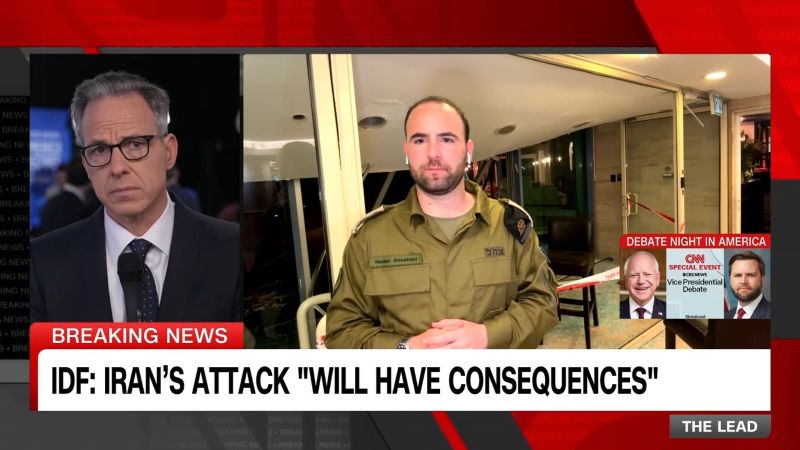In the days after Hamas’ October 7 attack on Israel, fears ran high of a regional war. The conflict would not be contained in Gaza, the thinking went – Hezbollah would attack Israel from the north, the Houthis from Yemen, and Iranian proxies from Iraq. Israel would be forced to respond, it would come into direct conflict with Iran, and the wider war would be upon us.
Nearly one year later, all those things have come to pass. A day after Iran launched its largest ever ballistic missile attack on Israel – and as Israeli troops battle Hezbollah fighters on the ground in Lebanon – regional war is effectively here. The big question now is: Will it escalate, or cool?
Israel’s leaders stand at a juncture. When Iran first staged a missile attack in April, in retaliation for an Israeli strike on Iran’s consulate in Damascus, Israel was restrained, striking only an Iranian air defense installation in response.
But Iran’s attack on Tuesday night was unprecedented in its ferocity. Despite some strikes on Israeli bases, damage was minimal, nearly all missiles were intercepted, and one person – a Palestinian man struck by shrapnel in the Israeli-occupied West Bank – was killed.
Iran’s government has “absolutely no interest in a broader war,” government spokeswoman Fatemeh Mohajerani said Wednesday, adding that the country restrained itself after the assassination in July of Hamas political leader Ismail Haniyeh in Tehran “despite demands” from its people to respond.
Israeli Prime Minister Benjamin Netanyahu has ridden a string of assassinations around the Middle East to a remarkable political rehabilitation. Israel’s bombing campaign in Lebanon has devastated the civilian population – displacing more than 1 million people – but has achieved a long-coveted goal of at least temporarily neutering a persistent threat to the north. Why not seize the moment to weaken the patron state itself, Iran?
“The elimination of Nasrallah is a necessary condition in achieving the objectives we have set: Returning the residents of the north safely to their homes and changing the balance of power in the region for years,” Netanyahu said in the wake of a massive strike in Beirut last month that killed Hezbollah leader Hassan Nasrallah.
Two days later, he addressed Iranians themselves, saying, “when Iran is finally free, and that moment will come a lot sooner than people think, everything will be different.”
His stance is in tune with Israeli public opinion too. Former Prime Minister Naftali Bennett is leading the charge pushing for a maximalist response to Tehran’s attack, proposing that Israel bomb Iran’s nuclear facilities, which the US and others say are responsible for a weapons program, a charge Iran has long denied.
Iran’s two arms to fight Israel – Hamas in Gaza and Hezbollah in Lebanon – “are temporarily paralyzed,” Bennett said. “So it’s like a boxer out in the ring without arms for the next few minutes. Now is the time that we can attack, because Iran is fully vulnerable.”
That response, of course, carries with it the danger of the unknown. Hezbollah is certainly weakened, but no one knows for certain how much capacity it still has. The US government believes that Iran could build a bomb in just weeks once it decides to do so. Short of the nuclear option, Tehran has other ways of applying further pressure on Israel and its allies. Escalating responses could spiral completely out of anyone’s control and drag allies into the fight.
The former senior Israeli military official explained that “there are always schools of thought.” Bennett’s, according to the official, is that “it’s time to neutralize the whole axis of evil. We started with Hamas, then Hezbollah. It is now the time for Iran, maybe Syria.”
The former official said they had no direct knowledge of Israel’s plans but requested anonymity to discuss sensitive matters.
“Last night it seemed to me like it was going to be an overwhelming response,” they said. “This morning, I am getting messages that they are taking the time to think.”
A more restrained response would see Israel target a military facility, as Iran did on Tuesday in Israel.
“You could hit infrastructure, very similar to what happened in Yemen,” the former official, referring to an Israeli bombing campaign on the Houthi-controlled port of Hodeidah on Sunday. “National export of oil, or anything else.”
The unknown factor is how far Israel’s most important ally – the United States – will go in supporting its response.
“We have made clear that there will be consequences — severe consequences — for this attack, and we will work with Israel to make that the case,” US National Security Adviser Jake Sullivan said on Tuesday. “It is too early for me to tell you anything publicly in terms of our assessment or in terms of what our expectations are of the Israelis or the advice that we would give them.”


